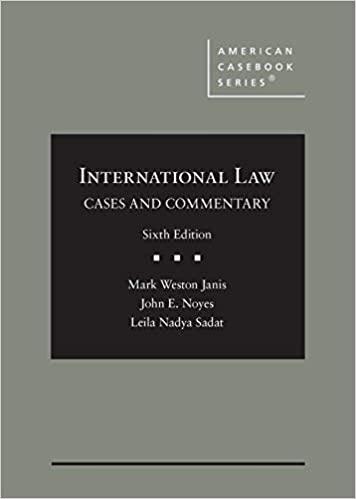Question
The Uniform Commercial Code, as you learned this week, creates exceptions for contract requirements when both parties to a contract are considered merchants. One of
The Uniform Commercial Code, as you learned this week, creates exceptions for contract requirements when both parties to a contract are consideredmerchants. One of those exceptions is the "10 day objection" rule we read about - if two merchants make an oral agreement about something, say via phone, and one merchant follows up with a writing that details the phone agreement, the other merchant has 10 days to object to whatever the writing says. For example, assume the price is $100,000 higher than what they talked about on the phone. If the other merchant does not object in 10 days, the writing with the higher priceis the agreement. The phone conversation does not matter.
This was shown in California in a case that involved literal tons of cotton (seehttp://ucclitigation.blogspot.com/2012/08/when-silence-is-your-signature-cotton.html(Links to an external site.)). "Apex sold cottonseed to Sharing World, which sourced the cottonseed to Korean end-users, primarily dairy farmers. Apex and Sharing World would exchange written purchase orders and counter offers. Once Sharing World okayed the quote, Apex would generate a written sales contract specifying the price, quantity, and shipment period. Each contract incorporated the rules of a trade association and had various terms on the back side. Sharing World did not sign the contracts, and it did not object either. Over the course of several months, Apex shipped tons of product. Problems developed when, due to price volatility, Sharing World was not able to lock in contracts with its end-users. Over a course of many months, Sharing World declined to accept about 14,625 tons of cottonseed."
In part, the court that looked at this case decided the UCC's 10 day objection rule applied here because they were both merchants. Sharing World was wrong to decline acceptance of the 14,625 tons of cottonseed because the court deemed its silence as a "signature" on the writing sent by Apex before shipping. As such, Sharing World was held liable for all of that cotton because their silence became a signature to a contract they say they never agreed to. But, because they did not object, the court deemed agreement by silence.
write whether you think this type of rule is fair. Why would we require merchants, specifically, to have fewer requirements? Think about the number of contracts a merchant does on a daily basis when you answer.
Can I get help with these questions?
Thank you!
Step by Step Solution
There are 3 Steps involved in it
Step: 1

Get Instant Access to Expert-Tailored Solutions
See step-by-step solutions with expert insights and AI powered tools for academic success
Step: 2

Step: 3

Ace Your Homework with AI
Get the answers you need in no time with our AI-driven, step-by-step assistance
Get Started


